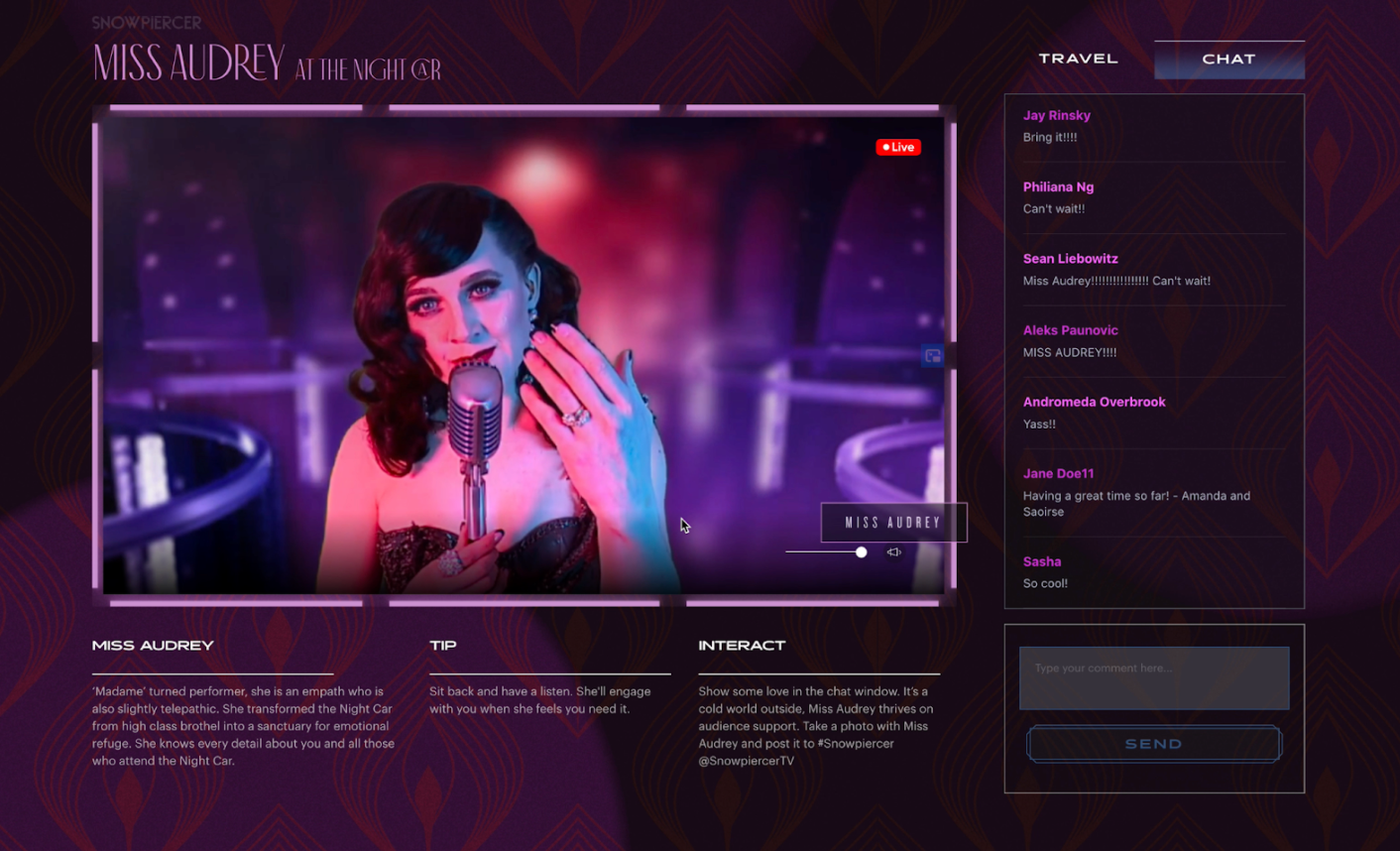
Jay Rinsky, founder of Little Cinema, landed in the immersive world by accident and didn’t really understand what the term meant at the time.
His background is multimedia design, and, prior to Little Cinema, he was a DJ performing in night clubs across Israel and Australia. “I spent my 20s DJ-ing and running an online learning business,” says Rinsky, “which I sold in my late 20s and went full time into DJ-ing and audiovisual art.” Little Cinema was born in 2016 at the famous House of Yes in Brooklyn, one of the first experiential and immersive night clubs in the world. “I started Little Cinema at House of Yes on the first opening week of the venue as an interesting take on a movie night. So the values of House of Yes were naturally in our DNA and put us somewhat on a map of immersive players,” adds Rinsky. The initial idea was to turn a movie night into a performance with the help of dancers, circus artists, musicians, and aerialists, but they didn’t have anything specific in mind. He recalls there was lots of magic in the air with very little planning. “I walked [in] and Anya Sapozhnikova and Kae Burke, two of the co-founders of House of Yes, were there talking about the fact that David Bowie just died, and I said, ‘Hey, tomorrow for the first night of Little Cinema, let’s do The Labyrinth… and that’s how Little Cinema started.” Their opening show at the House of Yes sold out in less than 40 minutes and they had less than 24 hours to prepare it.
“Anya called everyone within her House of Yes community and asked them what they could come up with for a tribute David Bowie act. Her and Kae went around and started sewing and making costumes. I started ripping, almost as a DJ, through all music videos and catalogs of David Bowie and found moments in the film where we could introject performance elements and mix other things with it. This was the first time we used the art form of DJ-ing in a film,” says Rinsky. In doing so, he reached back to his experiences using video projection to resurrect other departed musicians at the Israeli Opera House long before Little Cinema.
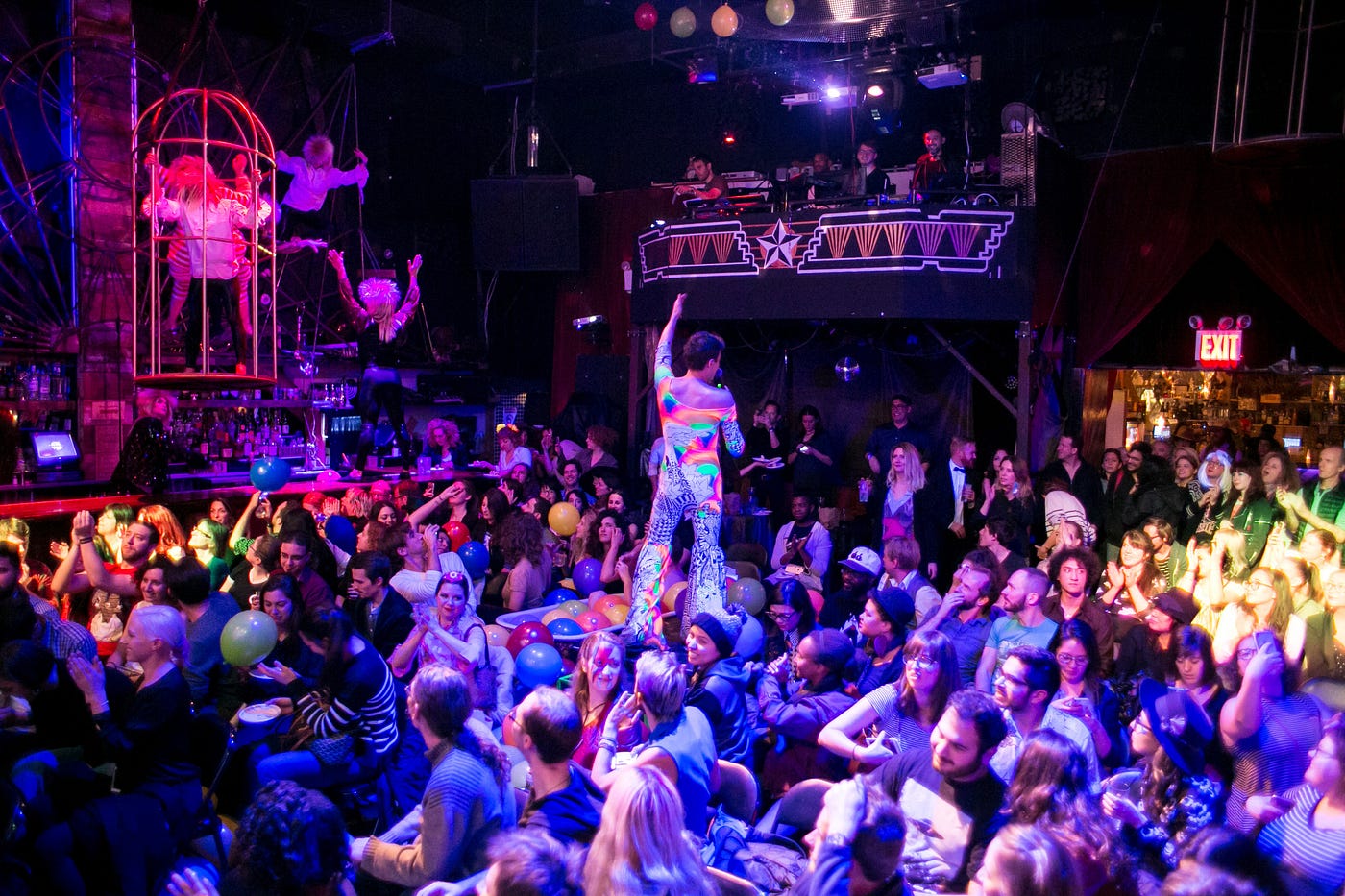
The show turned out to be a huge success. “It was a first time for me to watch a film and see an aerialist zip through the screen…. It ended with a 500-person party, rocking to David Bowie songs. We all woke up the next day and were like ‘What the %$#@ just happened!?’”
From One Off To Weekly
That response was so good, they decided to turn it into a weekly show, which Forbes quickly labeled the “SNL of Immersive Cinema.” “We went into a rigorous creative cycle where: on Wednesday, we’d feel like we were hit by a bus; on Thursday, we’d choose a film; on Friday, we’d clear the licensing for it; and, on Saturday, we would do a call to action and prepare the show,” says Rinsky.
Little Cinema’s approach to creating immersive work is rooted in the details of how story is woven through all the elements of the production. “A lot of our work starts with somebody else’s story. It’s a world that’s already been built and it’s up to us to translate that world into whatever environment we end up creating. It’s all about world building and understanding that your audience is part of that world. What role or character do they play within this environment?” he adds.
Their multi-sensory experiences never cease to impress. “When we did Wizard of Oz, we filled the room with the smell of poppy fields. We gave every single member of the audience a flower and had performers walk over the crowd as they turned into a poppy field,” adds Rinsky. His strategy for growth is making sure they always try something new in every show.
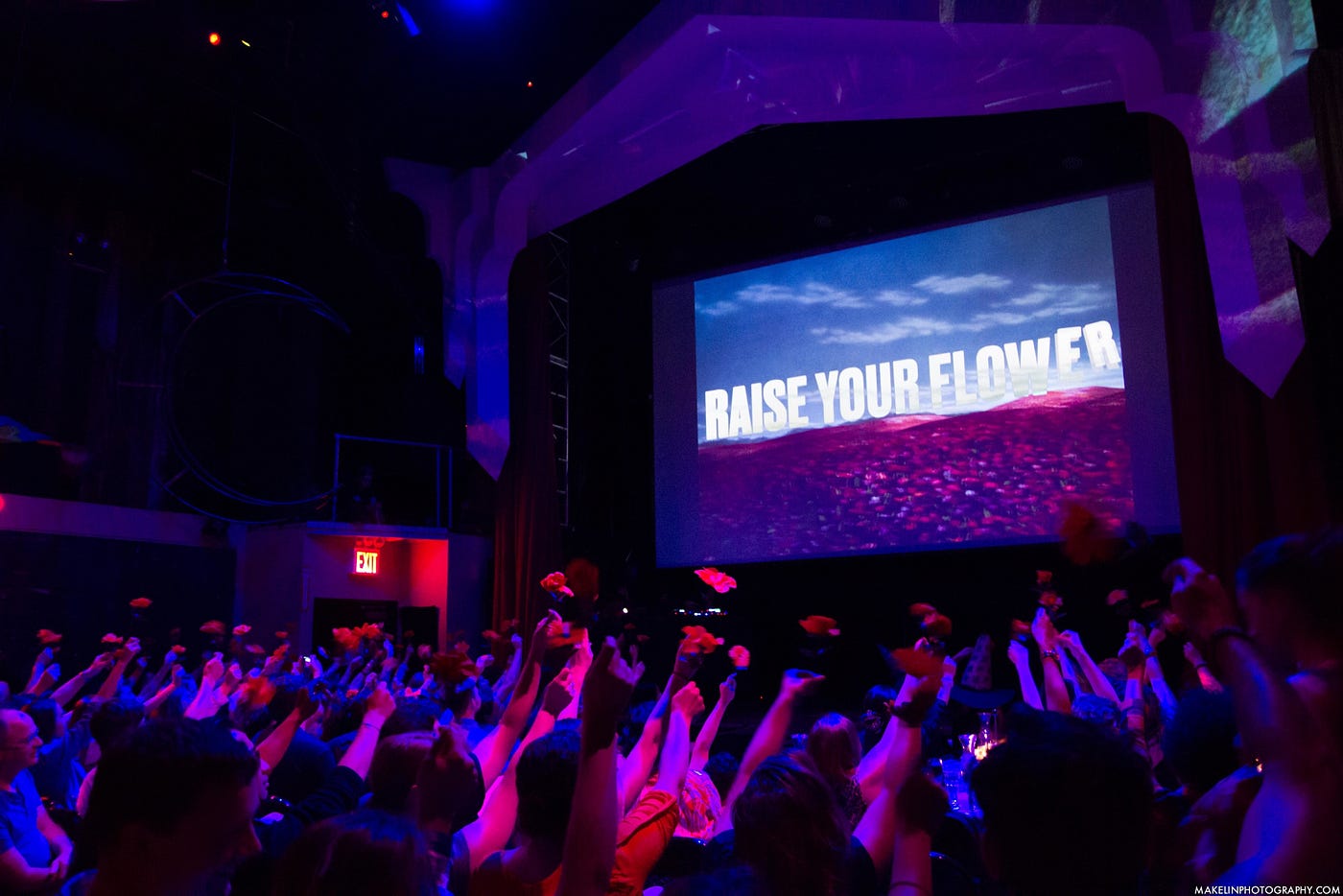
From The ‘House’ To The Red Carpet
When I met Rinsky in 2018, Little Cinema had expanded beyond weekly events at Bushwick’s House of Yes and became known for their immersive red-carpet premieres, screening events, and afterparties for awards in film and TV. They were setting up for a show at Paramount Studios in Los Angeles for the premiere of the mini-series, The Alienist.
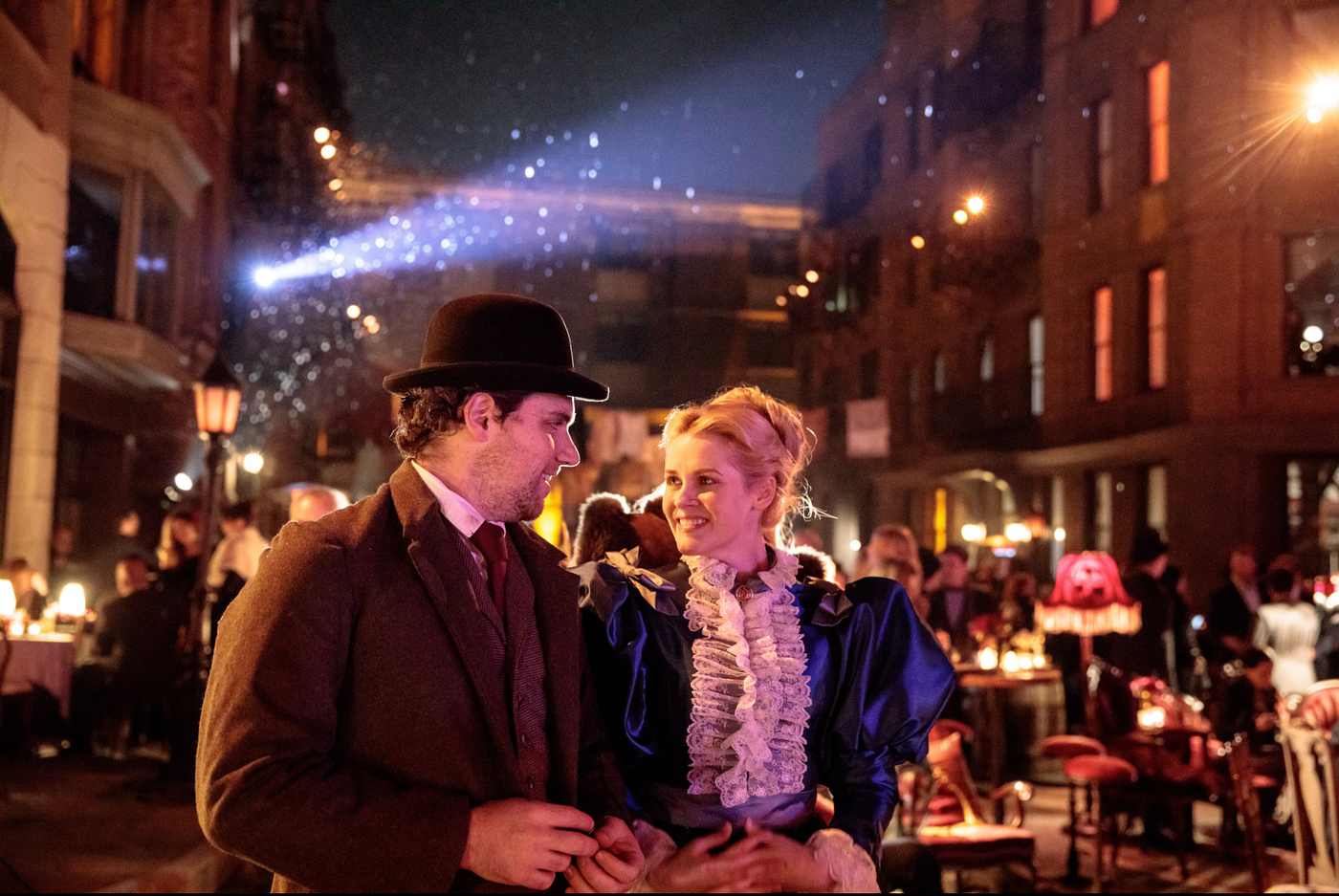
After the initial screening, guests left the theater and walked into a recreation of 1890s New York on the Melrose Avenue studio backlot. I was one of the performers on set and my character was a haberdasher who dressed visitors and transformed them into 1890s folk with fine golden pocket watches, hats, pashminas and beautiful broaches (you’ll even find me in the video below). Actual horses and carriages were out on the streets, and newspaper boys ran around exchanging coins with visitors, tricking them into yet another bet. In the middle of the street was a vaudeville stage with exceptional performances by jugglers, acrobats and musicians. A working recreation of Delmonico’s Restaurant (the first restaurant to open in New York City) served fresh oysters and delicious cocktails. Over 50 actors, musicians and performers created a fully immersive environment that was breathtaking not just to the audiences but the performers as well. It is no surprise, then, that the collaboration earned Little Cinema the BizBash Best Event Award in 2019. Little did they know, they would win another one in 2020, for The Alienist: Angel of Darkness Virtual Premiere that involved a murder mystery and a live escape artist.
The Alienist premiere reel, courtesy of Little Cinema
Rinsky-at-work looks like a magician: a creator of worlds who makes all the moving parts come together. “I had no awareness that there was a world of immersive. I didn’t even know exactly what a director or a producer did, but quite quickly after doing 15–20 of these, you learn on the job. It was that pace of energy and timing and magic that brought us together as well as having that fearless naïve spirit and just realizing that a job needs to be done without realizing what that job will be called,” he claims.
Get Sara Debevec’s stories in your inbox
Join Medium for free to get updates from this writer.
SubscribeSubscribe
In 2020, Little Cinema already had a dedicated following of fans. Their shows quickly sold out and Rinsky and his team regularly got commissioned by networks to create those big red carpet premiere events.
Pivoting As The World Fell Down
Last year, they were preparing to do one of their biggest activations ever at SXSW, at the legendary 2,500-seat Austin City Limits venue, home to legends like Nick Cave and Radiohead. This would have been followed by the launch of HBO Max on the Warner Brothers lot…. But the world stopped, the pandemic hit, and everything got cancelled.
“Initially, it was a sigh of ‘What the hell just happened!?’ and a moment of negativity on my end where I thought ‘I don’t know if I’m up for doing this on a computer!’ I then had a call with Shira Inbar, one of our motion designers and she basically told me: ‘You are looking at it the wrong way. In your past events, you had a bar. Why not send out drinks by mail and have the bartender speak to them on video?’ This sparked a new interest. Another big realization I had was that these film studios we were working with had no technical way of screening premiere events virtually.”
The studios needed video players that could deliver high quality and have to be secured against piracy. That led to partnering with Jon Blair, now Little Cinema Digital’s Chief Technology Officer. Together they sprung up a development team who built a new screening platform. The first test? The May 14, 2020 launch of the Snowpiercer TV series.
This was during a time of deep fear and uncertainty. “We [had written] the whole immersive creative for Snowpiercer. It was going to take place on the top of The Standard Hotel in New York. There was going to be a Broadway singer performing live, a dancer, a tarot card reader, a bartender, a magician…. We took the same creative and said ‘OK, how can we recreate it virtually?’”
The virtual afterparty began with a warm welcome by Jennifer Connelly followed by a live performance by the talented Lena Hall, then leading into multiple virtual rooms. “We kind of took every single one of these rooms [we had made for the physical version] into its own stream with its own theme and we booked six different performers all running at the same time, so people could interact with the performers and have somewhat of a similar experience to what we planned in real life.”
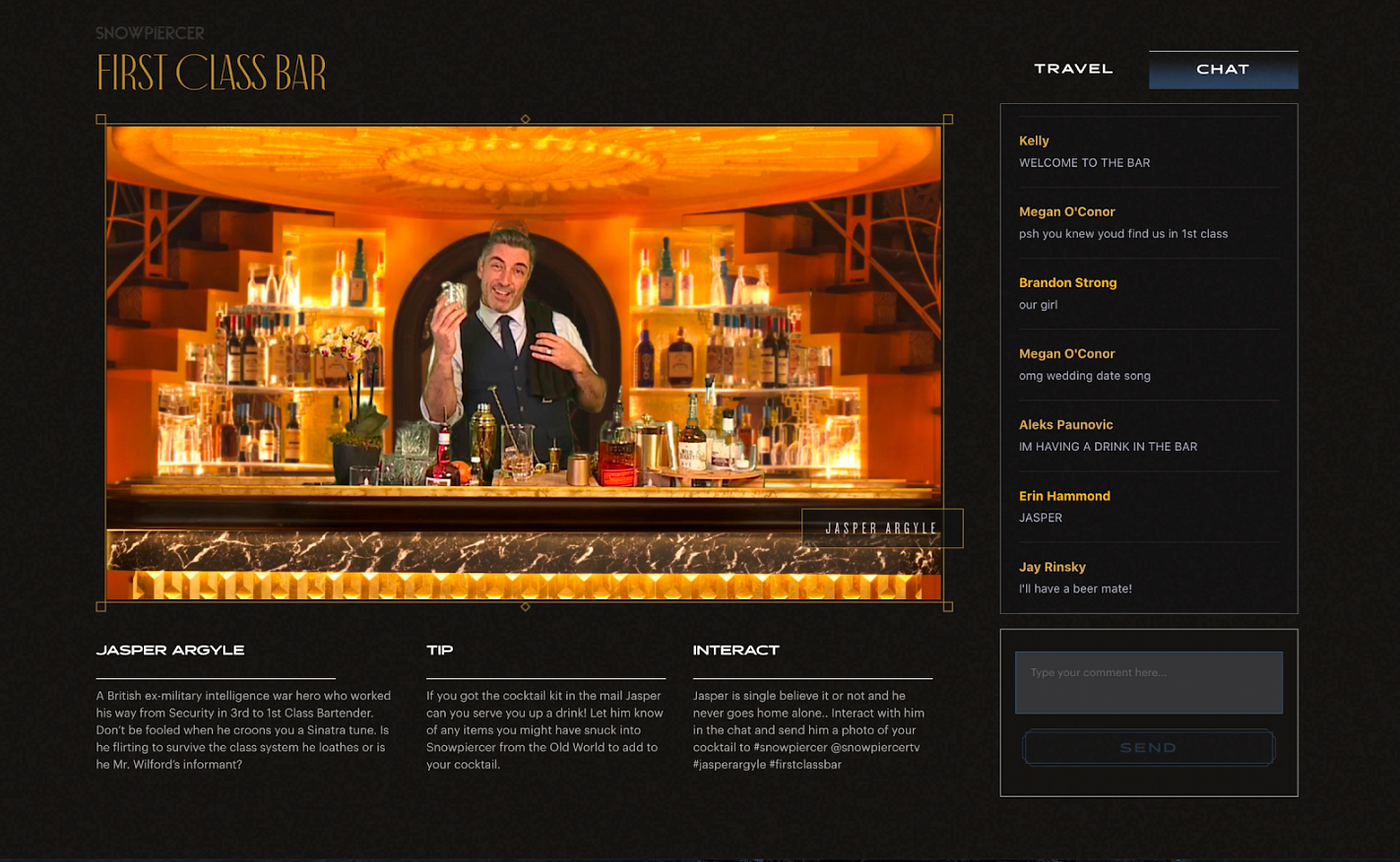
It was a powerful experience that sparked the same kind of energy as when Little Cinema Physical started — a full community going into a crunch mode to create something that has never been done before. “We had a week to tie all the narrative together between all the different performers. And they had never performed virtually, so there was a lot of learning to do. We were literally building green screen kits in people’s bedrooms!” laughs Rinsky.
The next day the buzz of that event got written up in Vanity Fair. “The same way we did DIY shows at House of Yes, we just kept innovating on the technology front and learning to work better as a team that manages each other remotely. In the last nine months, we had well over 50 events.”
Little Cinema virtual event reel, courtesy of Little Cinema
Little Cinema now has a technology division that builds tools that they use, along with a broadcast facility and a performance production arm. An 11,000 square foot sound stage in LA is home to their live stream sets and they also have a broadcast facility in New York.
The company’ s client base has also expanded in all directions. They worked with CNN over New Year’s Eve, linking Snoop Dogg’s compound in LA with their live broadcast in Times Square, creating a live recording that that very quickly went viral.
“Knowing the world of interface design, how people communicate remotely with computers and interactive web sites and the whole experience of theatre and events has definitely been a helpful background in launching Little Cinema Digital,” says Rinsky, who recently relocated from New York to LA for the winter. They’ve just concluded a major premiere for Warner Brothers and are working on a major premiere event with Amazon and Paramount Studios for Coming 2 America, which launches tonight. The company are also working on new premiere events for HBO Max, all while running on 20 events average per month for Netflix.
“We have 50 people and counting at the moment, and we are constantly reinventing ourselves. We are turning software production into an events business and fusing it with live theatre. As we move into a phase of [being] a mid-sized business of 50+ people, things like culture, values, onboarding, and growth means we have to implement a lot more systems without losing that kind of creative art collective spirit. We are learning on the job — inventing on the job,” adds Rinsky.
Little Cinema represents that rare thing in the Pandemic Age: an unbridled success story, with a future that looks brighter than it did before 2020 turned everything upside down.
Discover the latest immersive events, festivals, workshops, and more at our new site EVERYTHING IMMERSIVE, new home of NoPro’s show listings.
NoPro is a labor of love made possible by our generous Patreon backers. Join them today!
In addition to the No Proscenium web site, our podcast, and our newsletters, you can find NoPro on Twitter, Facebook, YouTube, Instagram, in the Facebook community Everything Immersive, and on our Slack forum.


















Discussion